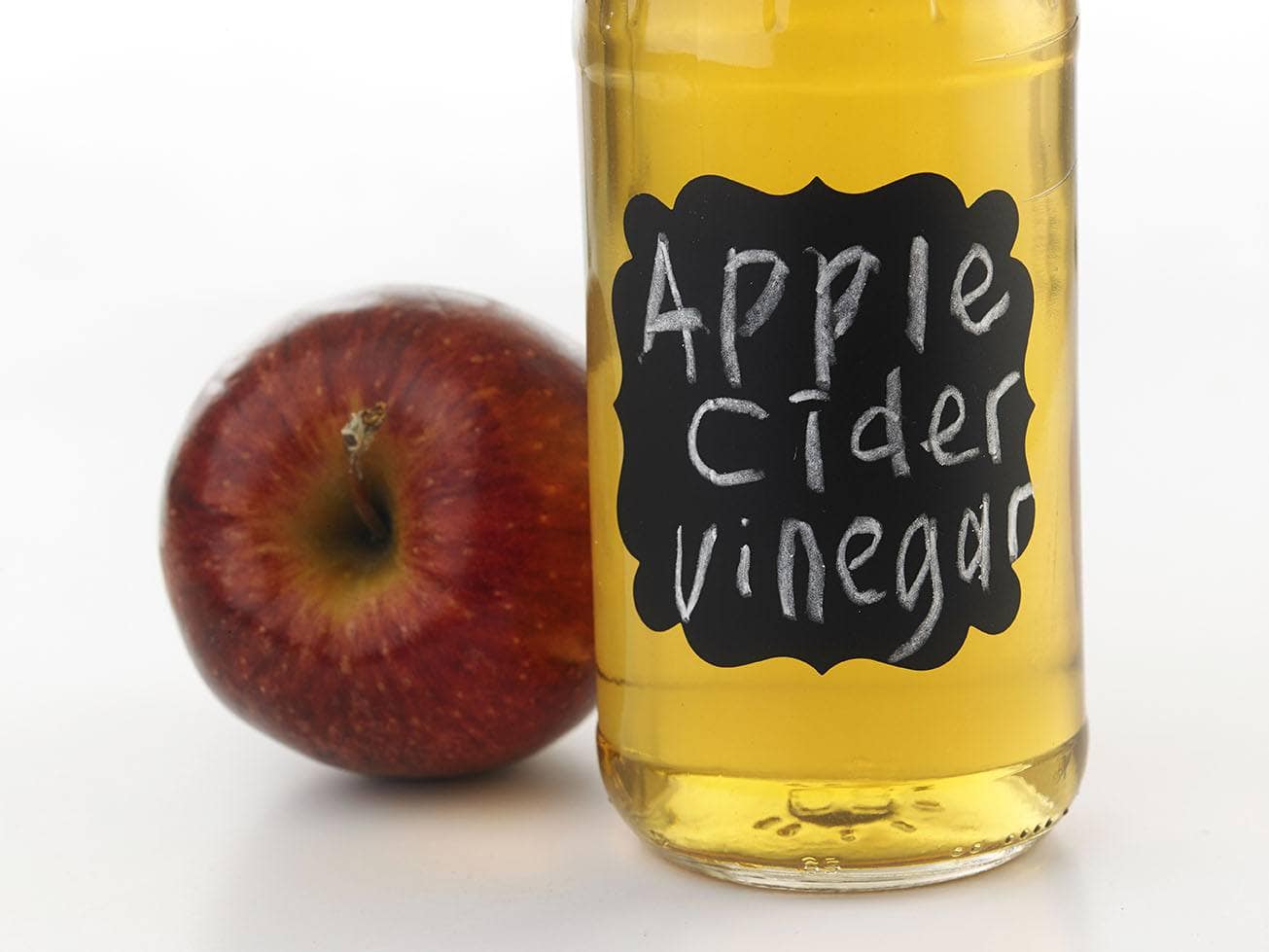VET APPROVED

The information is current and up-to-date in accordance with the latest veterinarian research.
Learn more »Apple cider vinegar has been touted as a tonic for everything ranging from promoting weight loss to helping blood sugar control in humans. It is used as a cleaner because of its antibacterial properties, and it is believed to act as an antioxidant as well as to help lower cholesterol.
With so many perceived potential benefits, it is little wonder that attention has turned to its use in animals. In particular, apple cider vinegar is proving to be a popular addition to a dog’s daily diet, although there has been very little to no research into its potential benefits as well as side effects. We would not recommend using apple cider vinegar without consulting your vet first.
Below are various ways in which apple cider vinegar has been suggested for use in dogs, although none of these potential benefits have any backing in science. We have also listed the possible side effects that the use of apple cider vinegar may cause in dogs.

The 5 Potential Uses and Myths Surrounding Apple Cider Vinegar and Dogs
1. Food Supplement
One of the ways people tend to give apple cider vinegar to a dog is to put it in their food. The vinegar does have a strong smell, and some dogs will be put off by the smell, while wet food will better mask the smell of the vinegar.
There is no scientific data that can confirm if there are any benefits to a dog’s health from having apple cider vinegar added to their food. This is certainly not something you should be doing without consulting your vet, especially in case they are suffering from health issues, such as diabetes, digestive issues, cancer, kidney disease, or urinary stones. Although there are anecdotal reports from some dog owners claiming that giving apple cider vinegar helped their dogs, there is no scientific evidence to say it may help with any of the above-mentioned conditions, and the worry is, it could leave serious health issues untreated or cause side effects.
If apple cider vinegar is too concentrated when offered to dogs orally, due to it being very acidic, it may lead to mouth irritation, drooling, vomiting, and diarrhea. If properly diluted and given now and then to healthy adult dogs, it’s unlikely to cause any significant health issues.

2. Adding It to Water
Some owners tend to add the apple cider vinegar to the drinking water. The problem may occur if your dog dislikes the taste of water with apple cider vinegar in it and chooses not to drink. This may lead to insufficient drinking and even mild dehydration in some cases. If you want to add dilute apple cider vinegar to your dog’s water for its assumed benefits, please only do so according to your vet’s advice and make sure you provide a separate bowl of clean and unaltered water so that there is still fresh water available.
3. Cleaning Ears
Apple cider vinegar has been used to clean ears, but this is not something we would ever recommend doing. Apple cider vinegar is acidic and may cause irritation or burns inside the ear canal if too concentrated. If there is a ruptured eardrum responsible for signs of ear disease and discomfort, this can lead to further complications and pain. There is no scientific evidence that apple cider vinegar has any benefits at all in treating ear infections, and it should not be applied inside ears, as well as any open wounds or cuts, despite its antibacterial properties.

4. Skin Treatment
Some suggest apple cider vinegar as a beneficial treatment for the skin. If your dog suffers from dry, flaky patches or you regularly find them scratching and biting at areas of the skin, speak to your vet first, as it’s likely that your dog is suffering from a skin condition and will require specific and more targeted treatment. If your vet gives you a green light to use a very dilute preparation of apple cider vinegar, then do follow their instructions, but avoid using it on open wounds and sores. It’s best applied to areas of dry or flaky skin, after the cause of such a condition has been established and treated. If your dog’s skin seems more irritated, itchy, red, or uncomfortable after applying the diluted apple cider vinegar solution, wash it off using lukewarm water and avoid using it again.
5. Cleaning the House
Apple cider vinegar has been used for its natural cleaning properties. It can disinfect surfaces and clean dirt and grime, allowing you to both protect your pup from the grime and clean up after them. Add some to warm water and then wipe surfaces, mop the floor, and clean stubborn stains.
You should conduct a spot test 24 hours before cleaning, applying a small amount of the solution on a single area of the floor or furniture, to ensure there is no discoloration or damage to the furniture.


The Debunked Benefits and Some Truths Regarding Apple Cider Vinegar for Dogs
1. Soothing
Apple cider vinegar is believed to be soothing on the skin. This is very much dependent on its concentration, as it’s an acidic solution and may irritate the skin at high concentrations. It can presumably remedy itchy and flaky skin, but this is not the case for every dog, depending on their skin condition, concentration of the solution, and individual sensitivities. Some dogs may have more irritated skin after this application, and apple cider vinegar should only be used very diluted, and if it has been recommended by your vet.
2. Natural
Apple cider vinegar is natural. It does not contain chemicals or toxins, and in most cases, even though it may have no proven health benefits, if given in a diluted form, it is generally safe to give to most healthy adult dogs. It’s best to consult with your vet first before offering or applying dilute apple cider vinegar on their skin, and perform a spot test or give a small amount initially to ensure that your dog is not sensitive.

3. Oral or Topical
It can be given orally, usually in food or water, and it can be applied topically, which makes it a convenient bottle to have around the house. It can even be used as a cleaning product.
4. Healthier Looks
Feeding or applying apple cider vinegar was believed by some to help keep the dog looking young. It does have antioxidant properties and may help in some cases of dry and flaky skin, but there is no scientific evidence to back up these claims, and they should be considered with a pinch of salt.

Conclusion
Apple cider vinegar is used by us humans to heal a variety of woes, and many people take it regularly as a tonic or preventative. There is, however, no scientific evidence to back up any of these potential health benefits in dogs, and it should not be given to them without consulting a vet. A small amount of properly diluted apple cider vinegar is unlikely to harm a healthy adult dog, but improper concentrations applied on a skin sore or inside the ear canal will lead to worsening of signs, causing burning, irritation, pain, redness, and discomfort.
Never give undiluted apple cider vinegar to your dog. Ensure that it is properly diluted, and do not give apple vinegar products that have been formulated for human consumption because they will contain additional ingredients that are not good for your pup. Always consult a vet before offering any supplements or applying skin products to your dog, as they may end up doing more harm than good.
Other interesting dog reads:
- DL-Methionine for Dogs: Benefits, Uses & Side Effects
- Benefits of Venison in Dog Food
- BHA and BHT: Dog Food Ingredients to Avoid
- Effects of acetic acid on the viability of Ascaris lumbricoides eggs: Is vinegar reliable enough to clean the vegetables? – PMC
- Pet Poisons: Be Mindful of these Household Products and Cleaning Agents | ASPCA
- Does Apple Cider Vinegar Kill Fleas? | PetMD
- Antimicrobial activity of apple cider vinegar against Escherichia coli, Staphylococcus aureus and Candida albicans; downregulating cytokine and microbial protein expression – PMC
- Can Pets Have Apple Cider Vinegar? | PetMD
- Apple cider vinegar for cancer: Myths and research
- Debunking the health benefits of apple cider vinegar – UChicago Medicine
Featured Image Credit: focal point, Shutterstock











